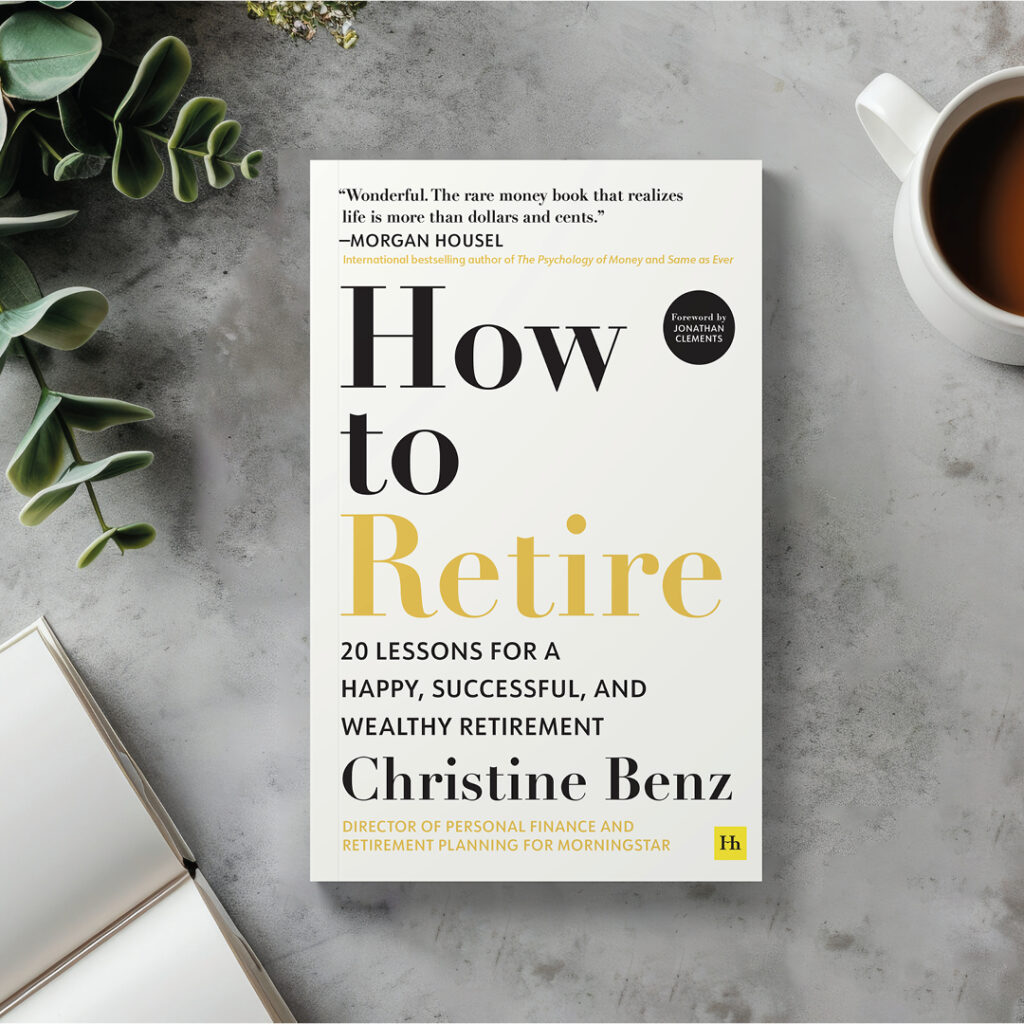
photo from Harriman House
By Joel Dresang
The closer I get to retirement, the more discerning I get about what I want to know. It’s as if I’m approaching a mountain resort, and what’s behind me downhill doesn’t matter as much; I need to focus more on reaching my destination and what I’ll do when I get there.
I expose myself to a smattering of retirement-related publications – online and in print, and while I’m still curious and learning, I’m finding my attention narrowing. But when I saw that Christine Benz was writing a book called “How to Retire,” I ordered a copy.
Benz is the director of personal finance and retirement planning for Morningstar. I’ve followed her on social media and admired her work for years.
The subtitle of the book is “20 Lessons for a Happy, Successful, and Wealthy Retirement.” The lessons are based on interviews Benz did with various experts she chose to discuss specific aspects of retirement. She also had a colleague interview her for a chapter.
Some interviews veer toward the deep end, but “How to Retire” is largely accessible and digestible, especially with Benz’s summarizing takeaways at the end of each chapter. Each chapter also includes suggestions for more information, which I appreciate.
I’m no expert on retirement – not even my own yet. No book will make me an expert, but I don’t need to be. I just need to feel comfortable with the path my wife and I are on and the plans we’re making.
“How to Retire” covers various strategies for planning, saving, investing and spending for retirement. Some of the approaches compete with one another, which is OK because it reminds us that there is not just one path for everyone to reach the retirement mountaintop.
Learn more
How to Retire, by Christine Benz
The Long View, an investing podcast hosted by Christine Benz
In fact, it’s healthy to know about diverse ways to invest and spend. I lean toward those that are most familiar to me. Whether from trust or ease, what I have been learning from my advisor makes more sense to me. If I found it hard to follow what an expert was explaining, I took heart in Benz’s note that investors should be wary of certain experts, “especially if they’re recommending complicated solutions and strategies that you don’t quite understand.”
Still, I’m open to other viewpoints. For instance, I’m intrigued by the concept of author and podcaster Ramit Sethi to set a “worry-free number” – a dollar amount below which individuals and couples need not justify their spending. It’s meant to address the difficulty of many retirees to enjoy their money after a lifetime of saving.
“How to Retire” isn’t just about the financial facets of retirement. In fact, I found greater value in some of the non-financial conversations.
“The more I’ve learned about retirement planning, the more I’ve come to understand that whether, when and how to retire is less than 50% related to money,” Benz writes. Besides funds, she says, retirees need support networks, healthy habits, a plan for how they’ll spend their days, and activities to keep them occupied.
Not to downplay the money-related benefits of the book, my top takeaways are from the non-financial side of the ledger:
- Retirement is ongoing. In the foreword, longtime personal finance columnist Jonathan Clements writes: “(V)iew retirement not as a done deal, but as a long period of trial and error – which, let’s face it, is what your life has been up until now …and that’s a big part of the fun.”
- Plan to adjust plans because the future is uncertain. “If we start with the notion that we are going to make adjustments, and we know the trade-offs we’re willing to make,” says author and retirement planning specialist Jamie Hopkins, “it creates a lot less fear about what retirement will be like.”
- Plan to adjust plans as time changes you. Michael Finke, a professor of wealth management, says: “One of the ways we’re failing in retirement is that we’re not recognizing that cognitive and physical decline are inevitable, and that they are going to mean that we are different people when we’re in the latter stages of retirement than we were in the early stages.”
- We have some control over how we age. Longevity researcherLaura Carstensen says: “(D)eveloping a healthy lifestyle will go a long way toward a long and healthy life, even if your genes aren’t working in your favor for most things. It’s very much about your day-to-day life and how you eat and move and socialize.”
- Retire purposefully. Author Jordan Grumet recommends retirees complete a life review, an exercise for hospice patients, in which they consider what was and wasn’t important in their life, the major events, the major successes and failures, the key people, what they have and have not accomplished and what they’d like to accomplish in their time remaining. Benz says to Grumet: “You’ve said that people don’t regret trying things and failing at them; they regret never trying.”
There’s much more in “How to Retire,” including bits I’ve been reading and writing about for years – trying to phase into retirement as a trial run, bequeathing some of your assets while you’re living, clearly communicating your final wishes in advance with your potential caretakers and beneficiaries.
I acknowledge that many of us don’t get the opportunity to plan or control how we retire, but we should at least consider how we’ll get there and what we’ll do. “How to Retire” is a useful guidebook.
Joel Dresang is vice president-communications at Landaas & Company, LLC.